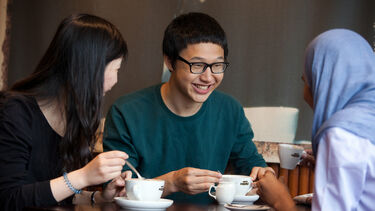Gaining real-world experience from an industrial placement should boost my job prospects in the future

Why did you want to do a placement year?
Having thoroughly enjoyed my first three years studying Chemical Engineering at Sheffield, I was keen to put my academic studies into context and get to grips with working practice in industry alongside professional scientists and engineers. I believe gaining this real-world experience should boost my job prospects in the future and improve my employability when applying for graduate jobs. A placement year is also great for networking as it is an ideal opportunity to start making industrial contacts.
What was the application process like?
As with most job applications, the process started by sending a CV and cover letter to the hiring manager that explained why I would be suitable for the role and why I wanted to work for Syngenta. The process was quite straightforward from there. I was informed that I’d been shortlisted to the interview stage. The interview involved general and technical questions as well as a 15-minute presentation. Shortly after, I was told that I had got the job, and gladly accepted.
What support did you receive from the University?
I received support from a plethora of staff at the University. I sought help from the Year in Industry team for CV and cover letter advice, as well as my employability advisor, who also prepared me for the interview stage. As I knew my interview would involve specific technical questions, I also asked for information from lecturers in my department who specialised in specific topics related to the job.
What has your Industrial Placement Year involved so far?
I was involved in a rotational programme where I partook in a research project for three different departments to help solve problems that the company was facing. My first project involved commissioning and optimising a new piece of spray granulation kit for formulation chemists to use.
This was then followed by a project focused on precision application of agrochemicals and how to manipulate atomisation through drift reducing agents. The final project I am working on now is working with experienced process engineers to investigate crystallisation scale-up.
My first project at Syngenta focused on the optimisation of the process conditions in the preparation of one of their best-selling fungicides using a newly installed fluidised-bed spray granulator at Jealotts Hill.
The main aim was to evaluate the usefulness of the equipment and to quantify which parameters have the greatest impact upon product yield and quality. Through the process of running 50 carefully designed experiments and statistical analysis of the data, it was possible to recommend some preferred process conditions for future product developments.
What have you enjoyed most about your time at Syngenta?
Having the opportunity to work with experienced scientists and engineers who are real industry professionals has taught me so much. The working environment at Syngenta has been great. Whether it’s a new start or a well-established engineer with 35 years in industry, everyone is willing to help.
This has really helped me to develop as a person and I have really enjoyed presenting to my colleagues and receiving feedback as I feel that it will really shape me as an engineer for the future. Presenting to industry professionals was one of my weaker points when starting my placement, but with practice and the encouragement from my colleagues I have really been able to improve this.
What skills have you developed?
There are a lot of skills that I have developed in my placement year. I have gained a plethora of lab experience and am fully trained on a range of equipment. Syngenta has lots of resources – if there is a new skill or experimental technique that I want to learn it can usually be facilitated.
My data interpretation skills have vastly improved through being trained on statistical software and design of experiments by key users. Syngenta offers a range of training seminars that I can attend to learn new skills, like modelling and coding. Working in three different departments has allowed me to network with a range of people and I hope to stay in contact with these people throughout my engineering career.
I have thoroughly enjoyed this year, which has excited me for the future. It has confirmed my desire to apply everything from my degree and what I have learnt this year to a chemical engineering job. After graduation, my next steps will be to work on obtaining a Chartership with the Institution of Chemical Engineers (IChemE) by continuing to work on projects that I am passionate about.

International undergraduate scholarships
We offer a generous package of financial support for international undergraduate students, including scholarships worth £10,000 towards the annual tuition fee.
Applications are open for existing offer holders for an undergraduate degree programme starting in autumn 2025.


